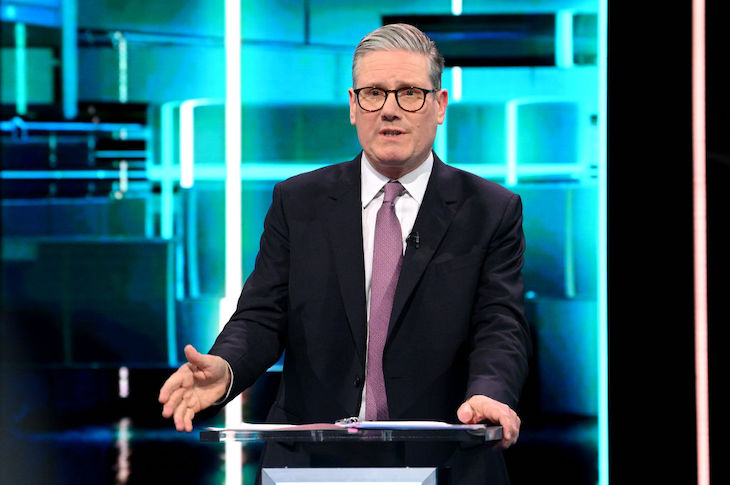Is the Labour party planning a £2,000 tax grab on households? That was Rishi Sunak’s main message last night during the first election debate on ITV – one which he was found by YouGov’s snap poll to have won (just). The Tories will ‘keep cutting taxes’, he said, while Labour will raise them. It took some time for Keir Starmer to hit back at the accusation, and the specific number, which he eventually called ‘absolute garbage’.
Starmer said the £2,000 figure was based on ‘dodgy assumptions’ and had ‘glaring mistakes’
Where did the figure come from? And how accurate is it? The document, titled ‘Labour’s tax rises’ was put together by Tory aides, using costings produced by the Treasury.Despite suggestions that civil servants were involved, it has been confirmed by James Bowler, permanent secretary to the Treasury, that they were ‘not involved in the production or presentation’ of the document. The BBC this morning has got hold of a letter addressed to the Labour party from Bowler, which states that Tory ministers were told these calculations ‘should not be presented as having been produced by the civil service’.
The Tories are facing pushback this morning for trying to bill this document as an independent piece of research. Nevertheless, the numbers in it have grabbed attention. It’s a calculation of the ‘tax gap’ between Labour’s spending pledges and revenue raisers, which goes through each proposed plan to see if the numbers add up. For VAT on private school fees, for example, Treasury numbers suggest that this is likely to raise closer to £1 billion per year, compared to the £1.7 billion Labour has been touting. This number could drop lower depending on how many parents take their children out of private school. Pull together every Labour pledge – which the exercise appears to have done – and it produces a spending plan worth almost £60 billion over the next four years, and only £20 billion of tax rises and efficiency gains to pay for it.
Break that down, and you get a £10 billion-a-year gap Labour has to fill through taxes or borrowing. And the Tories have decided what Starmer’s government would do about it: they’ve come up with an average tax rise per household to account for the multi-billion pound hole.
It’s a simple way to determine whether a party’s plans have been costed – if the assumptions put into these equations are correct. Labour says they are not. Indeed, after a long delay in last night’s debate, Starmer started to address the £2,000 figure, saying it was based on ‘dodgy assumptions’ and had ‘glaring mistakes’. Since then, Labour spokespeople and sources have been adamant that the Tories have misrepresented their spending plans. They accuse the Conservatives of costing planned pilots as full-blown schemes or assuming that certain spending plans are bigger than Labour intend.
Are these numbers correct or overblown? That Tory aides determined what numbers were and weren’t included in the calculations makes it impossible to say this was an independent assessment of the impact of Labour policies on the public finances. But we can’t know how accurate it is until Labour publish their manifesto, an event which is expected to take place next week. The party has promised it will be fully costed, which should allow their manifesto numbers to be compared to the Treasury’s numbers and the Tories’ analysis. It will also allow for a comparison between what has been assumed will be pledged by Labour in this election, and what spending promises are actually confirmed by the party itself.
But much of the political damage will be done in the meantime, as the £2,000 figure dominates the news today yet cannot be properly debated until next week. This is, of course, not the first numbers game to be played in this election. The Labour party has repeatedly claimed that the Tories are offering over £70 billion of unfunded tax cuts – a number that reflects the party’s long-term ambition to abolish employee National Insurance and inheritance tax. The Tories have made clear neither will be included in their manifesto – that it’s a goal to achieve over many future parliaments – yet it is being used by Labour anyway as evidence of uncosted policy.
Both are playing the political games you’d expect in any election. But this one is slightly harder for Labour to win, for two reasons. First, one of the biggest criticisms of Sunak’s time in the Treasury is that he raised taxes so many times to try to balance out the spending side of the ledger. The idea that he would then plan tens of billions of pounds of uncosted tax cuts doesn’t gel with workers’ experiences (indeed, they’ve felt his tax rises). Second, it is Labour that has played a cautious and clever game resisting calls to commit to (or to rule out) specific tax hikes. But it’s time may be up, as pressure mounts for the party to detail their plans.
If you don’t write your own tax and spend narrative, someone may come along and do it for you. It seems the Tories have been very happy to oblige.








Comments